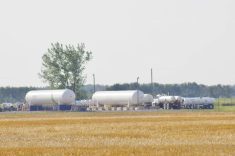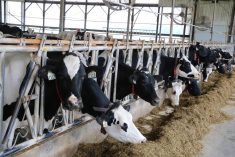El Nińo coming: Australia’s Bureau of Meteorology says an El Nińo weather system in the Pacific Ocean would be established by September-November at the latest.
The bureau said there was now agreement between international weather models that an El Nińo, which can bring drought conditions to Australia and weaken Asian monsoons, would be established by the Southern Hemisphere spring.
“The same six models…predict established El Nińo conditions (across a range of climate indices) by the southern spring at the latest,” said the bureau. – Reuters
Read Also

Mazergroup’s Bob Mazer dies
Mazergroup’s Bob Mazer, who helped grow his family’s company into a string of farm equipment dealerships and the main dealer for New Holland machinery in Saskatchewan and Manitoba, died July 6 from cancer.
No-till eggs?:
Quebec’s provincial Agriculture Department and the farmers’ direct-seeding group Action semis direct have set up a certification program tying livestock and eggs to direct-seeded feed crops.
The group will expand its Terre Vivante program to certify grain-fed veal, young pigeon and table eggs as having been produced using grain produced under zero tillage. The certification program requires crop producers to register acres to the program and commit them to direct seeding for a minimum of three years.
Top Dogs recalled: Maple Leaf Foods said Aug. 3 it is recalling nine wiener products produced under the Hygrade, Shopsy’s and Maple Leaf brands at its plant in Hamilton, Ontario, due to the possibility that they may contain traces of listeria monocytogenes.
No illnesses have been reported. Cooking hotdogs to steaming hot also kills any potential foodborne bacteria, such as listeria,” the company says in a release. It says it is awaiting government approval of new testing procedures that would provide results more quickly.
West Nile on vacation: No mosquitoes infected with West Nile virus have been identified so far in 2009, although provincial officials say that could change with rising populations of Culex tarsalis, the type of mosquito most likely to carry the virus. In previous years, the peak risk periods for human exposure to West Nile virus have been the last two weeks of July to the first two to three weeks of August, the province says. With warm weather, it is likely the risk of West Nile virus exposure could rise during this time.

















